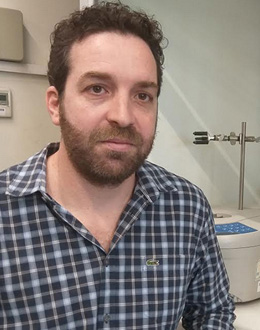
17.02.2020

Mr. Prousis, you are an Associate Researcher in ICB/NHRF. What is your area of research interest?
Firstly, I would like to thank you for the opportunity you give me to talk about myself and my research activities. I would like to share with you the joy and thrill I felt in achieving the goal I had set for myself about a decade before when I came to the NHRF as a postdoctoral researcher: one day to become a researcher and set up my own research team. It is a great honor for me to formally join as a researcher, in July 2018, the research team of the Institute of Chemical Biology (ICB/NHRF) which is truly unique in Greece.
The activities of ICB/NHRF researchers is fully in line with the Institute's name, as it has all the necessary components, namely, skilled scientists, know-how and state-of-the-art equipment for the Drug Discovery and Development Process. In addition, it is a great benefit for me both as a human and researcher to be among distinguished scientists, in a team and collaborative spirit and mainly to work with researchers who are looking in the same direction.
As regards to my research interests, these are in the field of Chemical Biology and, more specifically, in the field of Synthetic Chemistry and Molecular Optical Imaging. In particular, my research team's activities are aiming at tackling deadly diseases with a social and economic impact, such as cancer, neurodegenerative diseases (Alzheimer's, Parkinson's, Multiple Sclerosis) and Parasitic Neglected Diseases.
How does your sector approach the diseases of modern life? Where are you focusing on?
Talking about the diseases of our times, the one that comes to mind first and foremost is cancer. Cancer is at the center, while it constitutes a deadly and multifactorial disease and -despite some exceptions- its treatment has been found only with approximate treatments with low rates of total cure. This is why the efforts made by a large number of research teams worldwide are constantly increasing.
Our activities regarding the approach of diseases follow two main directions:
What are the difficulties you face as researcher?
In my opinion, the researcher's life should be -and really is- full of challenges. I firmly believe, however, that the greatest of these is to maintain your ability to provide solutions at all levels relevant to your work. On the one hand, you have to answer the various research questions that are of concern, and on the other hand, you have to organize, train, impart your knowledge and experience to young emerging researchers.
I would call it a challenge and not a difficulty to try to attract funding through competing research programs which I consider to be an urgent need and must be incessant in order to continuously fuel my team's research activity, ensuring the continuity and sustainability of it.
We would like to talk to us about EuroNeurotrophin, an EU research program on the neurodegenerative diseases you are involved in.
The EuroNeurotrophin research project is an innovative European network funded under the ITN-Marie Skłodowska-Curie project and co-ordinated by ICB/NHRF, with 15 academic and private sector stakeholders from all over Europe (www.euroneurotrophin.eu). It has been in progress from 2018 until the end of 2021.
The project aims to propose therapeutic approaches for neurodegenerative diseases that affect a large part of the world population, such as Alzheimer’s, Parkinson’s and Multiple Sclerosis.
As part of the project, training of fourteen (14) young scientists in therapeutic approaches to neurodegenerative diseases is underway focusing on the combination of Pharmaceutical Chemistry, Isolation of Natural Products, Computational Drug Design, Structural Biology and Pharmacology and “omics” technologies.
Questions posed by Eleni Markopoulou